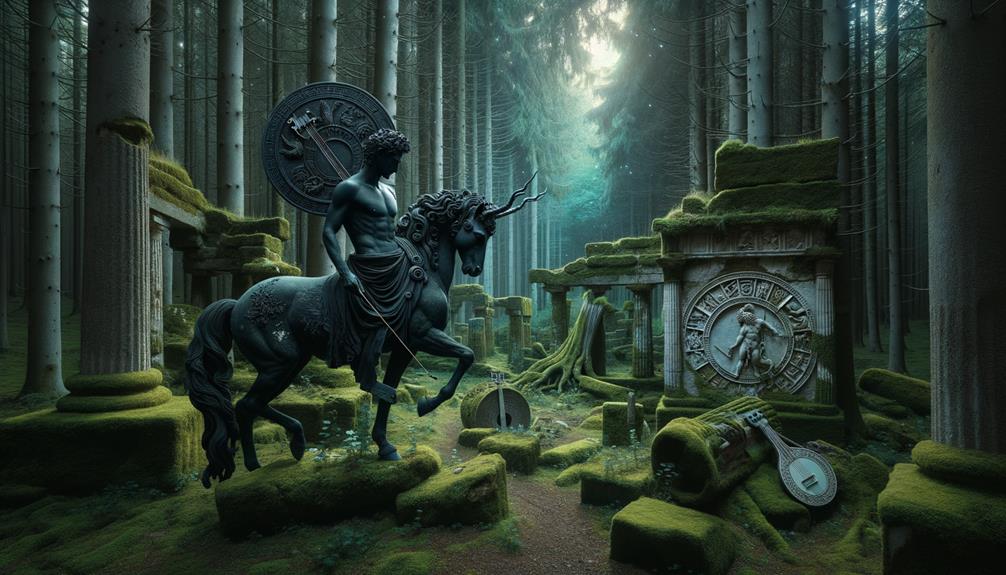While journeying across Greece, I stumbled upon a remarkably preserved piece of 5th century BC pottery. It depicted a centaur, part-man part-horse, locked in battle with a Greek hero. This wasn't just an artist's fancy, though. It held a deeper, more enduring symbolic meaning that centaurs have carried in various cultures around the world. These dual-natured creatures, representing both human intellect and animalistic instincts, illustrate the internal struggles we all face. So, let's chat about the cultural meaning of centaurs, from their roots in ancient mythology to their symbolic roles in diverse cultures, right up to their continuing impact in our current world. Are you intrigued about what these mythical creatures symbolize? Well, get ready for an engaging trip into the realm of myth and symbolism.
Centaurs in Historical Art
Centaur art from history is rather fascinating, isn't it? You've got these half-human, half-horse beings popping up all over the place in ancient sculptures, paintings, and even pottery. Now, that's not just a random design choice. It's a testament to the deep influence these creatures had on ancient Greek culture.
See, when you're looking at an image of a centaur, you're looking at a compelling study in contrast. This is a creature that's part human and part animal, a symbol of the tension between logic and instinct, between society and the wild.
Take Chiron, for instance, who's probably the best-known centaur in Greek mythology. You can still find him appearing pretty regularly in Greek art, which just goes to show how much these creatures still resonate with us. You could stroll through the Metropolitan Museum and see several interpretations of centaurs from ancient Greece.
You'll find centaurs portrayed in many different ways, from noble human-like figures to embodiments of savage instincts. Each interpretation gives us a new perspective on the complexities of ancient Greek society and their understanding of the world. What's interesting is that you can find similar half-human, half-animal portrayals in other cultures too, which tells us that this fascination with mythical creatures isn't just a Greek thing.
Greek Mythology and Centaurs
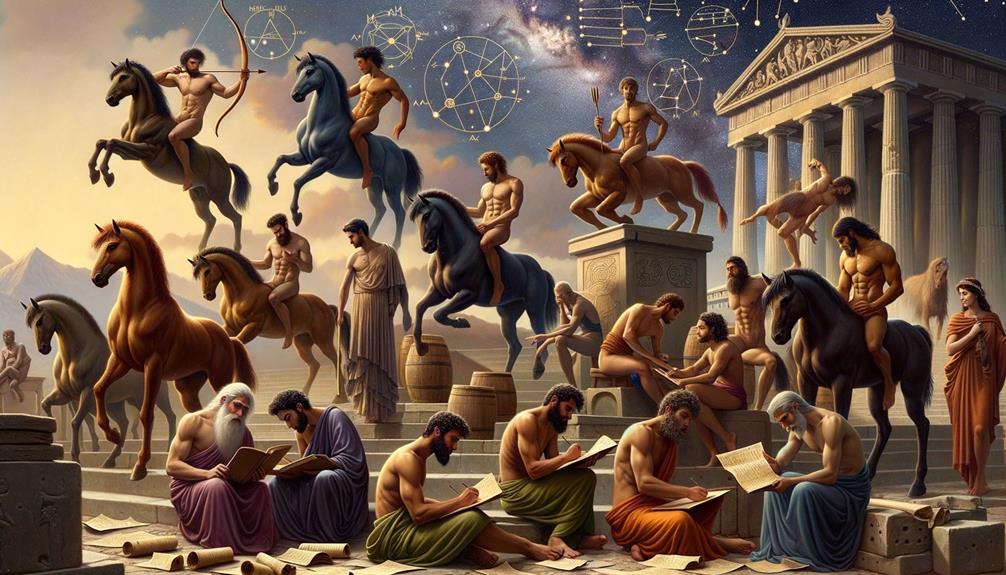
Let's chat about Greek mythology, especially that fascinating character, the centaur. Imagine a creature that's half-human, half-horse. It symbolizes the constant tug-of-war between the civilized world and the untamed wild. The centaur, with its human intelligence and animalistic instincts, stands as a symbol of two opposing forces. Its existence in Greek mythology mirrors an ancient society's attempt to understand these opposite elements.
There are several noteworthy centaurs in Greek mythology, each having their own engaging narratives:
- Chiron: Chiron wasn't like the others, he was known for his wisdom and his knack for healing. He played the role of a mentor to many Greek heroes, like Achilles and Jason.
- Eurytion and Nessus: These two are classic examples of the stereotypical centaur – wild, lustful, and uncontrolled. They often found themselves in conflict with heroes, symbolizing the battle between the civilized world and the wild.
- The Centauromachy: This legendary fight between centaurs and Lapiths is a favorite theme in ancient art, representing the struggle between order and chaos.
The centaur, an intriguing mythical creature, allows us to investigate our human nature, highlighting the contest and interaction between the civilized and the wild within us.
Centaur Symbols in Astrology
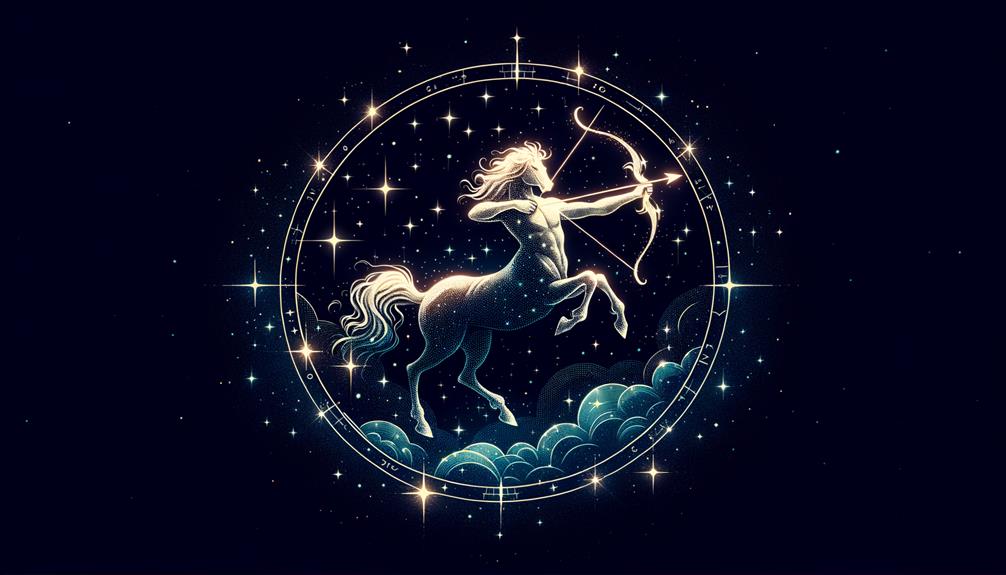
Centaur symbols hold a special place in astrology. They are particularly tied to Chiron, who embodies our dual human-animal nature. This symbolism nudges us towards our hidden emotional traumas and highlights the possibility for spiritual growth and recovery. Let's talk about centaurs – they were mythical beings, part human, part horse, and they perfectly represented the mix of the refined and the untamed. Chiron stood out among centaurs. Unlike his fellow kin, Chiron was admired for his wisdom and his flair for healing, traits that are echoed in astrological interpretations.
Chiron and centaurs offer a rich and layered symbolism. To understand this better, let's look at this simple breakdown:
| Centaur Symbol | Meaning |
|---|---|
| Chiron | Healing, Transformation |
| Half-human, Half-horse | Duality, Balance |
| Centaurs Smile | Joy, Positivity |
The multifaceted nature of centaurs, their connections to Greek deities, and their representation in astrology underscore our potential for growth, change, and the harmony of our dual nature. The narrative that uses centaurs as metaphors for internal scars and healing emphasizes our resilience and personal growth capabilities.
Influence of Centaurs in Literature
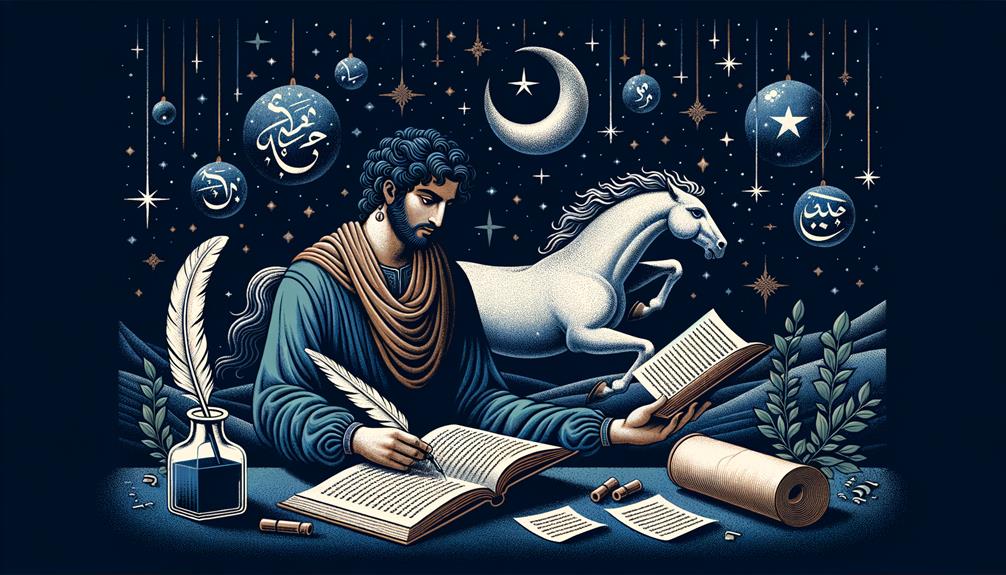
Centaurs, those mythical creatures that are half-human, half-horse, have made an impressive impact on literature. Their presence spans from ancient Greek epics to today's fantasy novels. These peculiar creatures have sparked the creativity of authors for countless generations.
Let's talk about how centaurs have shaped literature:
- Take a trip back to Greek mythology. Here we find the famous centaur, Chiron. Hailing from Thessaly, Chiron stood out from the crowd. He was wise, skilled in medicine, and noble—a pleasant change from the usually rowdy and passionate centaurs.
- Fast forward to the present day. Centaurs have trotted into beloved series like 'Harry Potter', 'Percy Jackson', and 'The Chronicles of Narnia'. In these tales, they often represent wisdom, nobility, and a magical allure.
- But centaurs don't just contribute to literature with their unusual appearance. They symbolize deeper themes of duality – the battle between civilization and raw nature and the clash between human intellect and animalistic drives.
The unique mix of human brainpower and horse strength in centaurs keeps our interest alive. This tells us that these mythical beings are still as relevant today as they were in ancient times, in our cultural and literary worlds.
Variations of Centaur Myths
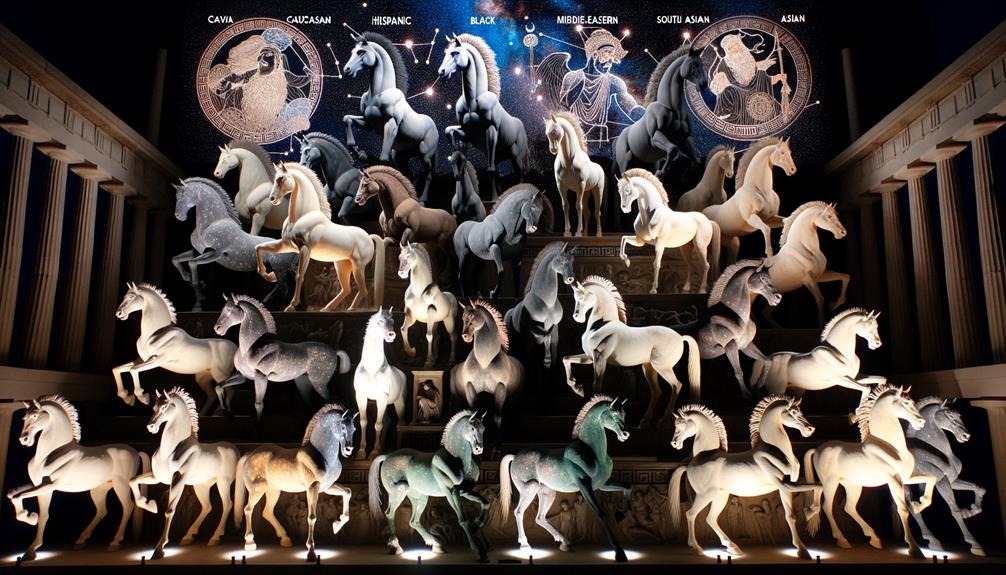
Immerse yourself in the captivating world of centaur myths and you'll find a treasure of diverse tales, woven across cultures and time periods. The centaur, a mythical beast that blends the characteristics of a horse and a human, originates from Greek and Roman tales. Often, we see them in art and stories, pulling Dionysus's chariot and causing quite a stir with their rowdy behavior.
Of course, there's more to the story. Enter centaurs Chiron and Pholus, both famous for their wisdom and kindness. Chiron, the successor of Cronus, was known for his healing skills. He preferred the solitude of Mount Pelion in Thessaly, distancing himself from his raucous centaur kin. Pholus, meanwhile, was a friendly centaur associated with the constellation Centaurus.
The Bronze Age brought a new narrative to the mix: centauromachy, a fierce battle between humans and centaurs depicted in various forms of art and literature. This clash underscored the ongoing tussle between civilization and unchecked wilderness, an idea that recurs often in centaur myths.
These different versions of centaur myths underscore their multifaceted nature and open up new avenues for interpretation and study. The centaur, a symbol of dual nature, remains a source of fascination, pointing to the timeless allure of mythology.
Frequently Asked Questions
What Is the Significance of Centaurs in Greek Mythology?
You know those half-human, half-horse creatures in Greek mythology, right? They're called centaurs. They're pretty fascinating as they represent this ongoing struggle between the civilized world and wild nature. It's like they're this mix of our human smarts and those raw, untamed animal urges. Kind of chaotic, don't you think? But there's also this sense of power, dignity even. It's kind of like looking at both sides of the human coin, you know?
What Is the Myth Behind Centaurs?
Isn't it funny how we often dismiss myths as mere stories, and yet, they often carry profound insights? Take, for example, the myth of centaurs, those mythical creatures born from Ixion and Nephele. This fable demonstrates the timeless tug-of-war between our human logic and untamed impulses.
What Is the Centaur Famous For?
Centaurs have quite the reputation! They're known for their unique mix of both the civilized world's structure and the wild unpredictability of nature. They can be a bit rowdy, but that's not all. Some centaurs, like Chiron, are highly respected for their wisdom and guidance they provided to the heroes of Greek lore.
What Does the Centaur Represent in Astrology?
In the realm of astrology, you know, the centaur is a pretty fascinating symbol. It kind of stands for this internal struggle we all deal with, where we're trying to balance our polished, civilized side with our more raw, wild instincts. It's a bit like having two sides to a coin – on one side, there's human logic and reason, and on the other, there's uncontrolled nature. It's this ongoing tension that the centaur beautifully encapsulates.

